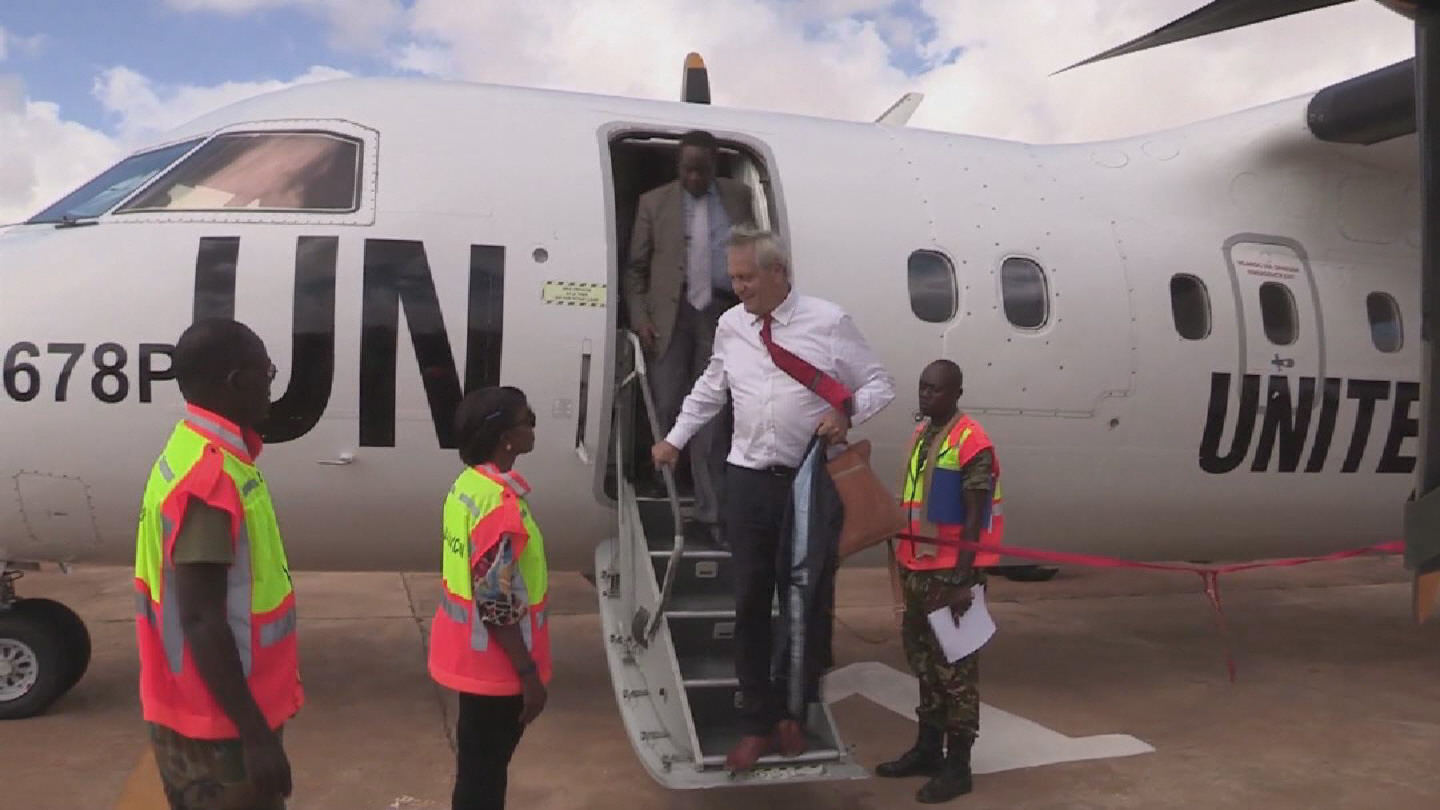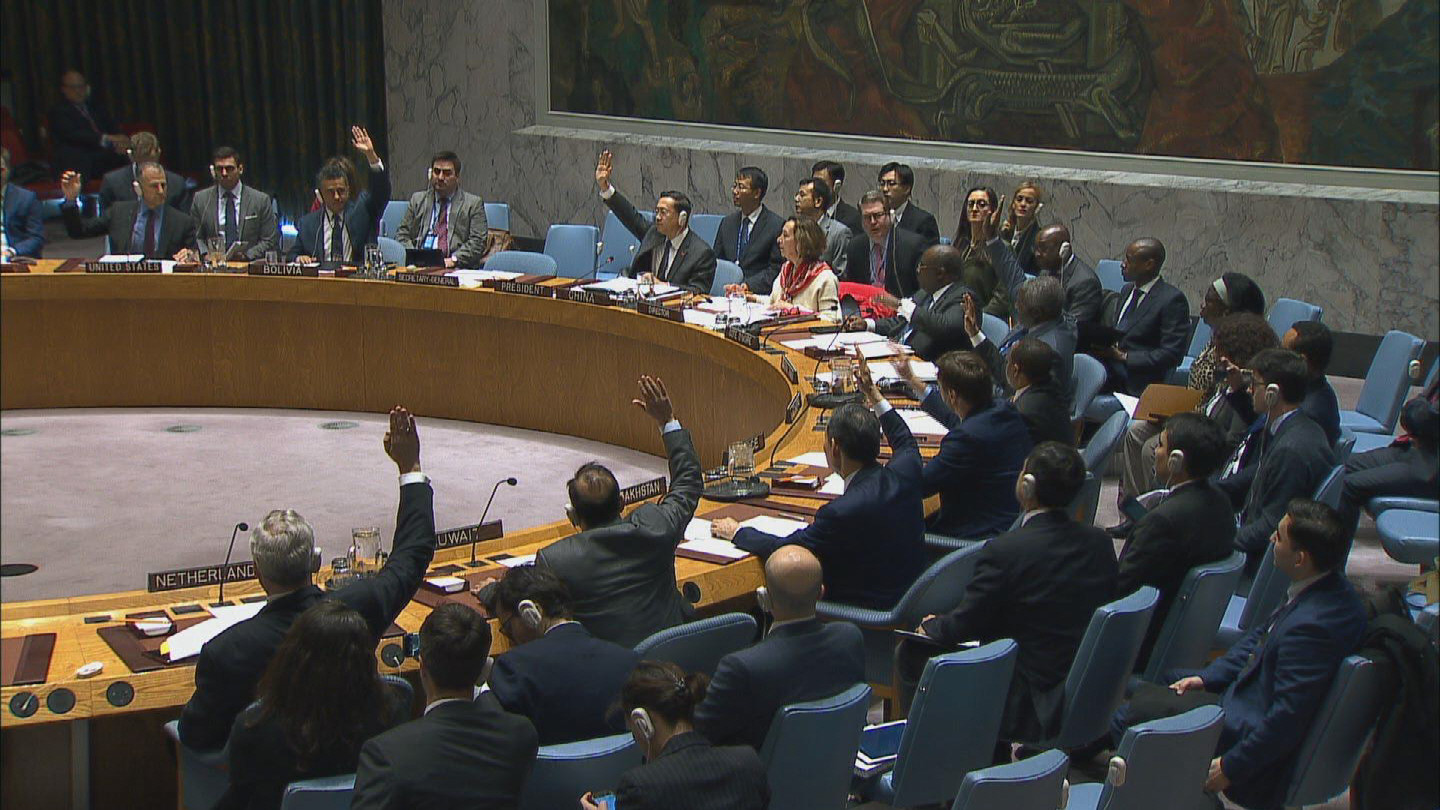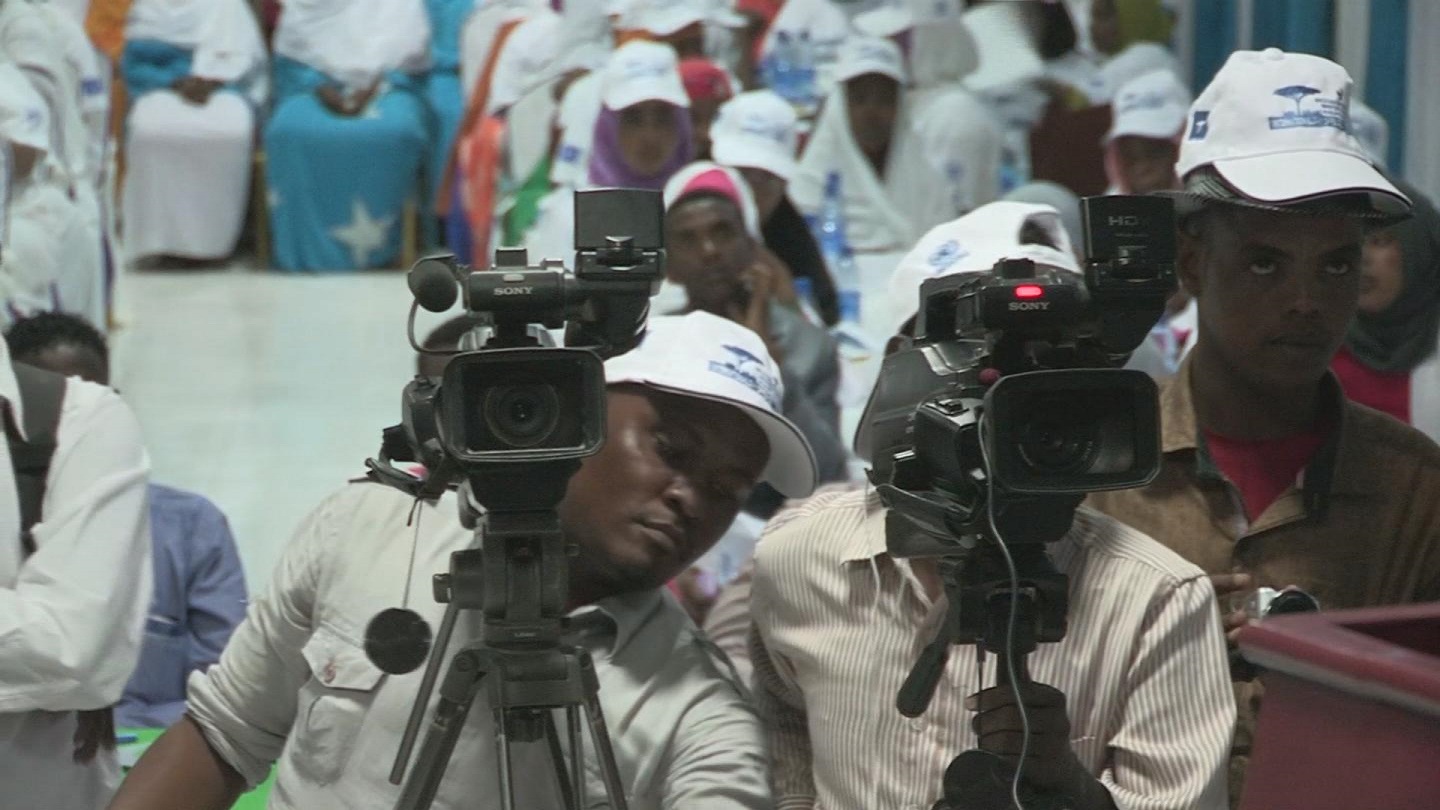UN / SOMALIA WRAP
Download
There is no media available to download.
Share
STORY: UN / SOMALIA WRAP
TRT: 3.43
SOURCE: UNTV
RESTRICTIONS: NONE
LANGUAGE: ENGLISH / NATS
DATELINE: 10 AUGUST 2011, NEW YORK CITY
RECENT 2011, UNITED NATIONS HEADQUARTERS, NEW YORK CITY
1. Wide shot, exterior United Nations Headquarters
10 AUGUST 2011, NEW YORK CITY
2. Wide shot, Security Council Chamber
3. Cutaway, Security Council members
4. SOUNDBITE (English) Augustine Mahiga, Special Representative of the Secretary-General for Somalia (AMISON):
“The humanitarian situation in Somalia and the region in general is uppermost in our minds. The scale of humanitarian suffering is immense and the international community is mobilizing and trying to meet this remarkable challenge.”
5. Cutaway, delegates
6. SOUNDBITE (English) Augustine Mahiga, Special Representative of the Secretary-General for Somalia (AMISON):
“The TFG (Transitional Federal Government) and the AMISON both have limited resources to exploit the opportunity presented by the withdrawal of Al-Shabaab. Pockets of Al-Shabaab remain in Mogadishu. The security situation remains precarious and the insurgence are likely to resotrt to terrorist attacks and the guerrilla tactics targeting the TFG (Transitional Federal Government) and AMISON forces and unfortunately even the internally displaced and other civilians.”
7. Cutaway, delegates
8. SOUNDBITE (English) Catherine Bragg, Assistant Secretary-General for Humanitarian Affairs (OCHA):
“Tens of thousands of children have already died and many more will die in the coming days unless aid is provided to them. Under five mortality rates are higher than 4 per ten thousand per day in all areas of the south, peaking at 13 per ten thousand per day in the Riverine and agro pastoral areas of Lower Shabelle and among Afgoye and Mogadishu IDPs. Let me illustrate what 13 per ten thousand per day actually means; it means that by the time I go to bed tonight 13 people, 6 of whom will be under five would have died and tomorrow 13 will also die and will continue the day after that unless we can reverse the trend.”
9. Wide shot, Security Council meeting ends
10. Wide shot, press conference
11. Cutaway, journalists
12. SOUNDBITE (English) Major General Fred Mugisha, AMISOM:
“Probably we need between 12 and 15 thousand soldiers to be able to control this situation efficiently But we don’t have them, we don’t have enough armoured cars, we don’t have other capacities like air capacity and maritime capacity,”
13. Cutaway, journalists
14. SOUNDBITE (English) Major General Fred Mugisha, AMISOM:
“On the whole Shaabab I think they are weakening and with the continued effort we would even be in the near future ready to expand into other regions so that Somalia can stabilize and people can pick up their pieces and rebuild their country.”
15. Cutaway, journalists
16. SOUNDBITE (English) Augustine Mahiga. Special Representative of the Secretary-General for Somalia:
“But the most challenging part is the access through distribution by humanitarian workers. Mogadishu may now be relatively free although numbers are really swelling up of IDPs from all over and all the food that is arriving and assistance is almost outstripped by the new arrivals into Mogadishu and we are trying to cope with that. But there is still an issue in the rural parts and the strategy is to bring food as close as possible to the Shabaab controlled areas so that the victims of famine can have less distance to walk before they can be assisted.”
17. Cutaway, journalists
18. Wide shot pres conference
“The humanitarian situation in Somalia and the region in general is uppermost in our minds,” the top United Nations (UN) envoy in the country said today (10 Aug), urging the world community to provide more financial and logistical support.
Briefing the Security Council via teleconference from Somalia's capital Mogadishu, Secretary-General Ban Ki-moon’s Special Representative Augustine Mahiga added that the "scale of humanitarian suffering is immense and the international community is mobilizing and trying to meet this remarkable challenge,”
Citing last week’s withdrawal of Al-Shabaab Islamic insurgents from 95 per cent of Mogadishu, Mahiga called for greater funding and logistical assistance, including aviation and mine disposal equipment for the African Union (AU) Mission there (AMISOM).
The African Union had proposed increasing its capacity to 20,000 to ensure Transitional Federal Government (TFG) control of Mogadishu as well as expand from the south to the borders of Kenya and Ethiopia, areas still controlled by Al-Shabaab and other militant groups.
“The TFG and AMISOM both have limited resources to exploit the opportunity presented by the withdrawal of Al-Shabaab,” Mahiga said of a country that has been riven by fighting for the past 20 years, in which it has not had a functioning central government.
“The security situation remains precarious and the insurgents are likely to resort to terrorist attacks and guerrilla tactics targeting the TFG and AMISOM forces and unfortunately, even IDPs (Internally displaced persons) and other civilians,” he added.
Somalia and its neighbours are now confronting a massive humanitarian crisis with hundreds of thousands internally displaced persons (IDPs) and refugees driven from their homes by the fighting and one of the worst droughts and famines in recent memory.
Briefing council members on the humanitarian catastrophe in the country, Assistant Secretary-General for Humanitarian Affairs Catherine Bragg emphasized that “tens of thousands” of children had already died and many more would die in the coming days unless aid was provided.
Bragg noted that under five mortality rates were higher than four per ten thousand per day in all areas of the south, peaking at 13 per ten thousand per day in the Riverine and agro pastoral areas of Lower Shabelle as well as among Afgoye and Mogadishu IDPs.
“Let me illustrate what 13 per ten thousand per day actually means. It means that by the time I go to bed tonight 13 people, 6 of whom will be under five would have died and tomorrow 13 will also die and will continue the day after that unless we can reverse the trend,” Bragg stressed.
At a later video news conference from Mogadishu, AMISOM Force Commander Major General Nathan Mugisha said 12,000 to 15,000 troops were probably needed to secure Mogadishu efficiently. “But we don’t have them, we don’t have enough armoured cars, we don’t have other capacities like air capacity and maritime capacity,” he added.
Commenting on the remaining Al-Shabaab pockets, Mugisha said he thought that “on the whole Al-Shaabab are weakening”, allowing for a future expansion of AMISOM into other regions.
Mahiga stressed that the most challenging part was the access for humanitarian workers. He said that Mogadishu might now be relatively free but numbers were really swelling up with the internally displaced from all over and all the food and assistance that was arriving was almost “outstripped by the new arrivals into Mogadishu and we are trying to cope with that.”
Mahiga also added that in the rural parts the strategy was to bring food as close as possible to the Shabaab controlled areas so that the victims of famine could have less distances to walk before they could be assisted.
Of the $1 billion the UN sought in its Consolidated Appeal Process (CAP) at the beginning of the year, less than 50 per cent has so far been received.









